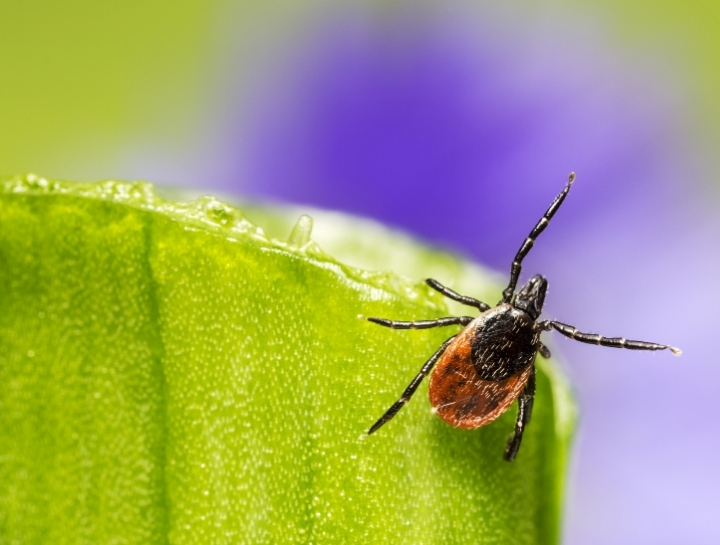Year Round Flea & Tick Prevention

We tend to think that flea and tick season in our area is prevalent more in the spring and summer time, but actually it is every season. Fleas and ticks are pesky external parasites that have potential to cause serious problems to your pet and even yourself. Here is some information about these pesky pests and our recommendations for prevention.
The soft, warm fur of dogs and cats, whether they have heavy coats or not, provides the perfect environment and breeding ground for fleas and ticks. These insects feed on your pet’s blood and can cause health problems ranging from allergic reactions (dermatitis) to serious tick-borne illnesses (Lyme Disease, Anaplasmosis, Ehrlichiosis, and others).
Signs of fleas you may notice on your dog include the following:
- Areas of hair loss (especially near the base of the tail)
- Significant itching
- Flea droppings (dark tiny specks) in their haircoat
- Scabs or "hot spots" on the skin
Purchasing a flea comb is an excellent method to detect both live or dead fleas and their eggs.
Fleas can take in 15 times their own weight in blood. Dogs or cats that lose too much blood may develop anemia, a dangerous drop in the number of their red blood cells. Puppies and kittens are especially at risk. Signs of anemia caused by fleas include pale gums and lack of energy.
How Do Pets Contract Fleas? Where in Your House Are They Living?
Pets can easily pick up fleas when outdoors. Indoor cats can get them even if they just go out on the patio or share their home with a dog. Female fleas can lay 40 to 50 eggs a day! That can lead to a serious infestation in just a matter of a few days.
When fleas lay eggs on your pet, some eggs may fall off and hatch on your carpet, bed, or other furniture. The new fleas then target you and your pet, feed on your blood, and lay more eggs. Carpets and humid areas are favorites for fleas. Replace carpeting and keep your home as dry as possible to make your house less friendly for fleas.
How to Safely Remove Ticks From Your Pet
Skip gasoline, nail polish, petroleum jelly, alcohol, or a hot match. These methods can force infected fluids back into the bite. These methods can be dangerous and annoying to your pet. Instead:
- Grasp the tick with tweezers from the side, by its head, close to the skin.
- Pull straight up. Don't twist.
- Don't squeeze (or pop!) the bloated belly.
- Use a tick spoon, which I highly recommend you obtain one from our hospital.
A Little Information on the Deer Tick
Deer ticks feed on many types of mammals, including people. The adults are reddish-brown and live in wooded areas generally in the Northeast and Midwest, but they can be found elsewhere. They're dangerous because they can transmit Lyme disease to dogs and people. Lyme disease causes fever and joint pain and, sometimes, serious kidney disease in dogs which can be fatal.
Signs of tick-born diseases include:
- Achy or swollen joints
- Fever
- Lethargy
- Loss of appetite
- Swollen lymph nodes
Treatment and Preventions of Fleas and Ticks
You probably are overwhelmed in knowing which preventive and treatment is best for your pet. It is perhaps just as difficult in choosing a preventive as it is in selecting the best nutrition for your pet!
At Brick Town Veterinary Hospital, we recommend either a topical flea and tick product called Parastar for dogs or topical Revolution for cats.
A majority of pet parents of dogs are preferring an oral flea and tick preventive for several reasons:
- Excellent safety profile
- Appropriate dosage administration
- Ability to bathe and swim their dog
- Palatability and ease of administration
Our BTVH team recommends Nexgard for puppies 6 months of age and younger and Simparica for any puppy over 6 months of age.
Some natural flea and tick remedies can cause severe reactions in cats and dogs. These include:
- Geranium
- Eucalyptus
- Pennyroyal oil
- Garlic and onion
Check with your veterinarian before giving your pet any type of herbal treatment.
Keeping Your House Free from Fleas and Ticks
The yard and house must be regularly cleaned. Consider having your backyard professionally treated for flea and tick prevention. Mow the lawn regularly, trim shrubs, rake leaves, and keep garbage covered so it won't attract rodents. Inside, vacuum carpets often with a rotary brush or beater bar. Empty canisters or throw away vacuum bags. Mop hardwood floors with detergent every week. Wash all bedding often.
